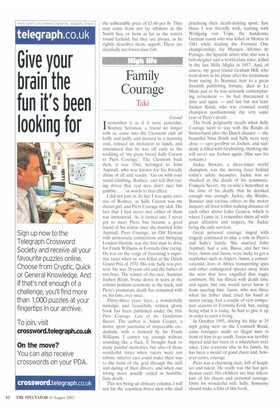Family Courage
Taki
Gslaad
Iremember it as if it were yesterday. Rodney Solomon, a friend no longer with us, came into the Clermont club all huffy and puffy and dressed in a morning coat, refused an invitation to lunch, and announced that he was off early to the wedding of 'my great friend Sally Curzon to Piers Courage'. The Clermont back then, it was 1966, belonged to John Aspinall, who was known for his friendly abuse of all and sundry. 'Go on with your social climbing, Rodney, and tell that racing driver that real men don't race but gamble . ' or words to that effect.
I did not join in. In fact I was quite envious of Rodney, as Sally Curzon was my dream girl, and Piers Courage my idol. The fact that I had never met either of them was immaterial. As it turned out, I never got to meet Piers, but became a good friend of his widow once she married John Aspinall. Piers Courage, an Old Etonian with aristocratic connections and Swinging London lifestyle, was the first man to drive for Frank Williams in Formula One racing. He was on the verge of becoming a superstar racer when he was killed at the Dutch Grand Prix of 1970. His wife Sally was present. He was 28 years old and the father of two boys. The winner of the race, Austrian Jochen Rindt. broke down in tears at the solemn podium ceremony at the track, and Piers's premature death has remained with us, his fans, ever since.
Thirty-three years later, a wonderfully nostalgic and beautifully written glossy book has been published under the title Piers Courage, Last of the Gentlemen Racers. The author is Adam Cooper, a motor sport journalist of impeccable credentials, with a forward by Sir Frank Williams. I cannot say enough without sounding like a flack. It brought back so many painful memories, but also of those wonderful times when racers were not robots, inferior cars could make their way to the front of the grid through the skill and daring of their drivers, and when one wrong move usually ended in horrible, fiery death.
This not being an obituary column, I will not list the countless brave men who died practising their death-defying sport. Just those I was friendly with, starting with Wolfgang von Trips, the handsome German count who was killed in Monza in 1961 while leading the Formula One championship; the Marquis Alfonso de Portago, the Spanish aristo who also was a bob-sleigher and a world-class rider, killed in the last Mille Miglia in 1957. And, of course, my good friend Graham Hill, who went down in his plane after his retirement from racing. Jo Bonnier, heir to a great Swedish publishing fortune, died in Le Mans just as he was seriously contemplating retirement — he had threatened it time and again — and last but not least Jochen Rindt, who was crowned world champion posthumously the very same year of Piers's death.
The book poignantly recalls when Sally Courage went to stay with the Rindts in Switzerland after the Dutch disaster — the beautiful Nina Rindt and Sally were very close — says goodbye to Jochen, and suddenly is filled with foreboding, thinking she will never see Jochen again. (She saw his remains.) Jackie Stewart, a three-times world champion, was the moving force behind today's safety measures. Jackie was so shocked at the death of his teammate, Francois Severt, my ex-wife's betrothed at the time of his death, that he decided enough was enough. Jackie, the Rindts, Bonnier and various others in the motor industry all lived within walking distance of each other above Lake Geneva, which is where I came in. I remember them all with great affection and respect, Sir Jackie being the only survivor.
Great personal courage tinged with tragedy continued to play a role in Piers's and Sally's family. She married John Aspinall, had a son, Bassa, and her two boys, Amos and Jason, were lucky to get a stepfather such as Aspers. Amos, a conservationist, lives in Africa transporting apes and other endangered species away from the wars that have engulfed that tragic continent. He has flirted with death time and again, but one would never know it from meeting him. Jason, who was three when his father died, tried his hand at motor racing, had a couple of very competent seasons in Formula Ford, but, racing being what it is today, he had to give it up in order to earn a living.
In October 1995, driving his bike at 35 mph going west on the Cromwell Road, some foreigner made an illegal turn in front of him to go south. Jason was terribly injured and has been in a wheelchair ever since. Like everyone else in his family, he has been a model of good cheer and, however corny, courage.
Piers was a charming man, full of laughter and talent. He really was the last gentleman racer. His children are true inheritors of his charm and personal courage. Ditto his wonderful wife Sally. Someone should make a film of this book.










































































 Previous page
Previous page